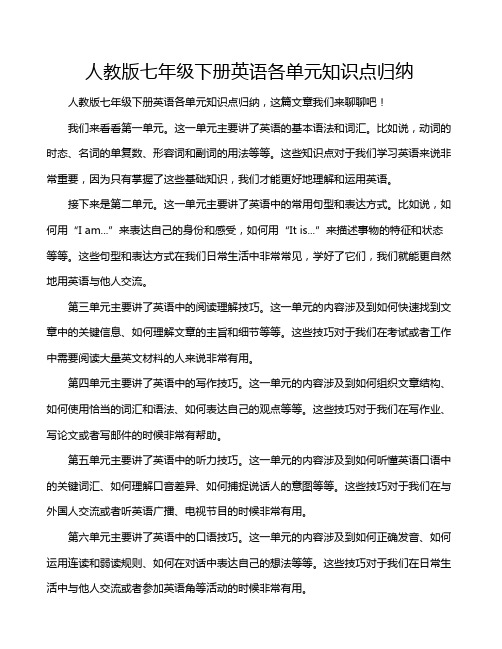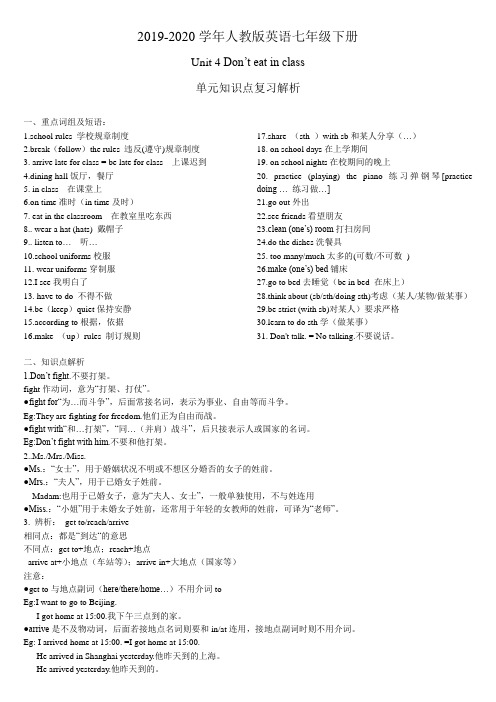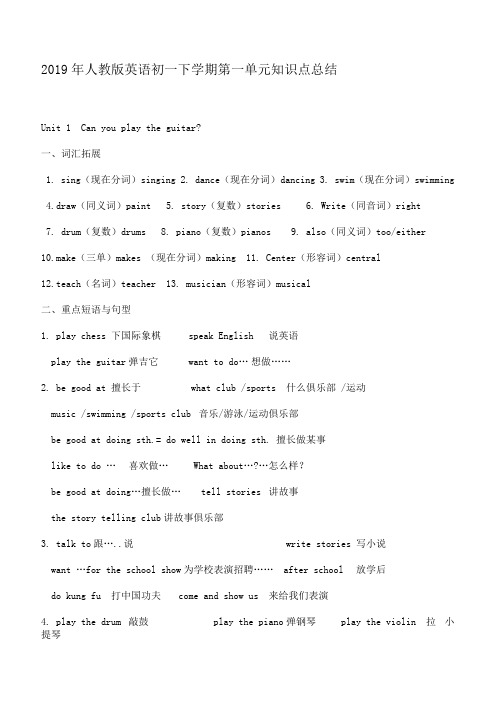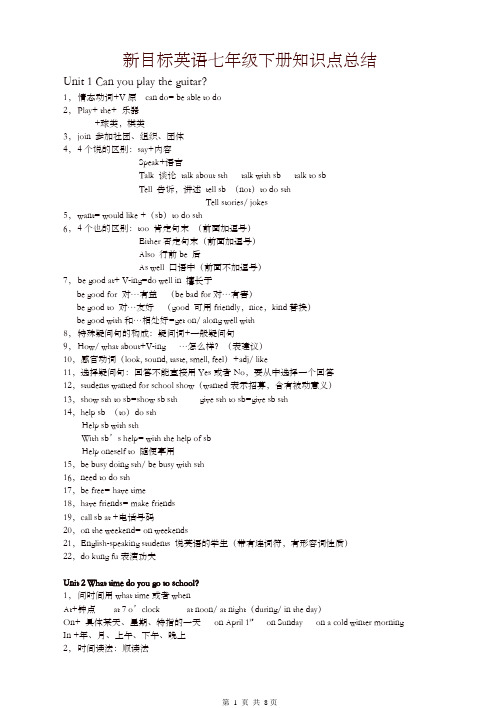2019年人教版七年级下册英语各单元知识点总结归纳
(完整版)新人教版英语七年级下册1-12单元知识点归纳

Unit 1 Can you play the guitar?语言点梳理一、语法:情态动词:有一定意义,表示说话人的语气或情态,但不能单独作谓语,只能和其他动词原形一起构成谓语,没有人称和数的变化。
否定形式是在情态动词后面加上not。
变一般疑问句要把情态动词提到句子的开头,即:情态动词+主语+动词原形+其他?1.肯定句:He/She/I/We/They/You/Tom+情态动词can+动词原形.2.否定句:He/She/I/We/They/You/Tom+情态动词can+not+动词原形3.一般疑问句:情态动词can+ He/She/I/We/They/You/Tom+动词原形?Yes,主语+can./No,主语+ can’t.1)表示能力,“会;能”。
eg: Can you dance? 你会跳舞吗?2)表示请求或许可,“可以”。
eg: Can I ask you a question? 我可以问你一个问题吗?1. play the guitar/piano/violin/drums弹吉他/钢琴/小提琴/敲鼓play chess下象棋play sports 做运动play soccer/basketball踢足球、打篮球(乐器名称前加the,球类名称前不加the)2. join the art club加入艺术俱乐部/swimming club游泳俱乐部sports club运动俱乐部/story telling club讲故事俱乐部English club/ art club/ music clubjoin v.参加,加入指加入某个团体,组织,群体,并成为其中的一员。
What club do you want to join ?你想加入什么俱乐部?I want to join the swimming club.=I want to be in the swimming club.takeEg. take part in the meeting参加会议3. want sth.想要某物want to do sth.想做某事want sb to do sth 想要某人做某事4. be good at(doing...)擅长于=do well in 在某方面做得好be good with与…相处的好be good for对…有益5. like to do sth.喜欢做某事like doing sth.6. Let’s do sth.让我干…let/make sb.do sth.使某人做某事10. write stories写故事write to sb= write a letter to sb= write sb a letter11.tell /speak/say/talk的用法1) tell讲述一件事实或故事等及物动词tell sb. sth 给某人讲某事=tell sth to sb 把某事告诉某人tell sb. to do sth 告诉某人做某事tell stories讲故事=tell a story tell a lie撒谎2)speak v. 主要是讲说话的能力,往往接语言speak English讲英语3)talk 为不及物动词往往加介词再接宾语talk to sb.和…交谈/talk with sb.和…交谈(指双方)4)say往往接说话的内容eg.Our teacher says we should study hard.say it in English用英语说它12. make friends with sb.和…交朋友13. play games with sb.和…做游戏14. help sb. with sth.= help sb. (to) do sth.帮助某人做某事15. call sb. at +电话号码给某人打电话拨+号码16. on /at the weekend 在周末on weekends after school放学后17.do Chinese kung fu 打中国功夫18.be free 空闲的19. sing very well 唱得好That sounds good. 那听起来很好20.English-speaking students 讲英语的学生学生运动中心23.also /too/eitheralso/too用在肯定句,also 用于句中,too 用于句尾,either用于否定句句未eg. I am a student . He is a student,too. I am a student . He is also a student.I am not a student . He is not a student, either.24.and/or 连接两个并列成分eg.I can sing and dance.(and用于肯定句)I can’t sing or dance.(or用于否定句)Can you sing or dance ?(or用于选择疑问句“或者”)25.at27. need to do sth需要干某事need sb. to do sth 需要某人干某事28.wanted students for School show学校表演招聘学生v.展示;给….看… show sb. Sth= show Sth to sb.给某人展示n.节目;表演TV show电视节目29.teach v.教,讲授teacher n.教师teach sb.English教某人英语teach sb. sth .= teach sth to sb.教给某人某事=教某事给某人teach sb.to do sth教给某人做某事30.music n.音乐musician n. 音乐家31.piano (pl.) pianosUnit 2 What time do you go to school?知识点梳理1.What time do you get up?What time +助动词do/does +主语+动词原形,询问某人做某事的具体时间。
人教版七年级下册英语各单元知识点归纳

人教版七年级下册英语各单元知识点归纳
以下是七年级下册英语各单元知识点归纳:
第一单元:
重点词汇:学习并掌握与学校生活、日常生活相关的词汇.如课程、活动、时间等。
语法知识点:学习现在进行时和一般现在时的用法。
以及情态动词can. may. must等的用法。
阅读理解:培养快速阅读和信息提取的能力,理解文章的主旨和细节。
写作训练:学习写简单的记叙文和说明文.注意文章的结构和逻辑性。
第二单元:
重点词汇:学习与兴趣爱好、体育运动、食物等相关的词汇。
语法知识点:学习一般将来时的基本结构和用法,以及比较级和最高级的用法。
阅读理解:提高阅读速度和理解能力,培养推理判断的能力。
写作训练:学习写电子邮件、信件等实用文体,注意写作的得体性和规范性。
第三单元:
重点词汇:学习与节假日、节日庆祝等相关的词汇。
语法知识点:学习一般过去时的用法,了解定语从句和状语从句的用法。
阅读理解:培养深层阅读的能力。
理解文章的深层含义和作者的意图。
写作训练:学习写简单的议论文.注意文章的条理性和逻辑性。
第四单元:
重点词汇:学习与旅行、旅游景点等相关的词汇。
语法知识点:了解并列句和并列复合句的构成和用法,以及宾语从句的用法。
阅读理解:提高推理判断的能力。
能回答关于文章细节、深层含义和作者观点等方面的问题。
写作训练:学习写复杂的记叙文.说明文和议论文。
注意文章的拓展和创新性。
人教版七年级下册英语各单元知识点归纳

人教版七年级下册英语各单元知识点归纳人教版七年级下册英语各单元知识点归纳,这篇文章我们来聊聊吧!我们来看看第一单元。
这一单元主要讲了英语的基本语法和词汇。
比如说,动词的时态、名词的单复数、形容词和副词的用法等等。
这些知识点对于我们学习英语来说非常重要,因为只有掌握了这些基础知识,我们才能更好地理解和运用英语。
接下来是第二单元。
这一单元主要讲了英语中的常用句型和表达方式。
比如说,如何用“I am...”来表达自己的身份和感受,如何用“It is...”来描述事物的特征和状态等等。
这些句型和表达方式在我们日常生活中非常常见,学好了它们,我们就能更自然地用英语与他人交流。
第三单元主要讲了英语中的阅读理解技巧。
这一单元的内容涉及到如何快速找到文章中的关键信息、如何理解文章的主旨和细节等等。
这些技巧对于我们在考试或者工作中需要阅读大量英文材料的人来说非常有用。
第四单元主要讲了英语中的写作技巧。
这一单元的内容涉及到如何组织文章结构、如何使用恰当的词汇和语法、如何表达自己的观点等等。
这些技巧对于我们在写作业、写论文或者写邮件的时候非常有帮助。
第五单元主要讲了英语中的听力技巧。
这一单元的内容涉及到如何听懂英语口语中的关键词汇、如何理解口音差异、如何捕捉说话人的意图等等。
这些技巧对于我们在与外国人交流或者听英语广播、电视节目的时候非常有用。
第六单元主要讲了英语中的口语技巧。
这一单元的内容涉及到如何正确发音、如何运用连读和弱读规则、如何在对话中表达自己的想法等等。
这些技巧对于我们在日常生活中与他人交流或者参加英语角等活动的时候非常有用。
第七单元主要讲了英语中的文化知识。
这一单元的内容涉及到英美文化的差异、英国历史和地理等方面的知识。
了解这些知识可以帮助我们更好地理解和运用英语,同时也可以增进我们对不同文化的理解和尊重。
人教版七年级下册英语各单元知识点归纳是非常重要的一本书,它涵盖了许多我们在学习英语过程中需要掌握的基础知识和技能。
2019-2020年人教版英语七年级下册 Unit4 Don't eat in class单元知识

2019-2020学年人教版英语七年级下册Unit 4 Don’t eat in class单元知识点复习解析一、重点词组及短语:1.school rules 学校规章制度2.break(follow)the rules 违反(遵守)规章制度3. arrive late for class = be late for class 上课迟到4.dining hall饭厅,餐厅5. in class 在课堂上6.on time准时(in time及时)7. eat in the classroom 在教室里吃东西8.. wear a hat (hats) 戴帽子9.. listen to…听…10.school uniforms校服11. wear uniforms穿制服12.I see我明白了13. have to do 不得不做14.be(keep)quiet保持安静15.according to根据,依据16.make (up)rules 制订规则17.share (sth )with sb和某人分享(…)18. on school days在上学期间19. on school nights在校期间的晚上20. practice (playing) the piano 练习弹钢琴[practice doing … 练习做…]21.go out外出22.see friends看望朋友23.clean (one’s) room打扫房间24.do the dishes洗餐具25. too many/much太多的(可数/不可数)26.make (one’s) bed铺床27.go to bed去睡觉(be in bed 在床上)28.think about (sb/sth/doing sth)考虑(某人/某物/做某事)29.be strict (with sb)对某人)要求严格30.learn to do sth学(做某事)31. Don't talk. = No talking.不要说话。
2019年人教版英语初一下学期第一单元知识点总结

2019年人教版英语初一下学期第一单元知识点总结Unit 1 Can you play the guitar?一、词汇拓展1. sing(现在分词)singing2. dance(现在分词)dancing3. swim(现在分词)swimming4.draw(同义词)paint5. story(复数)stories6. Write(同音词)right7. drum(复数)drums 8. piano(复数)pianos 9. also(同义词)too/either10.make(三单)makes (现在分词)making 11. Center(形容词)central12.teach(名词)teacher 13. musician(形容词)musical二、重点短语与句型1. play chess 下国际象棋 speak English 说英语play the guitar 弹吉它 want to do…想做……2. be good at 擅长于 what club /sports 什么俱乐部 /运动music /swimming /sports club 音乐/游泳/运动俱乐部be good at doing sth.= do well in doing sth. 擅长做某事like to do …喜欢做… What about…?…怎么样?be good at doing…擅长做… tell stories 讲故事the story telling club 讲故事俱乐部3. talk to 跟…..说 write stories 写小说want …for the school show为学校表演招聘…… after school 放学后do kung fu 打中国功夫 come and show us 来给我们表演4. play the drum 敲鼓 play the piano弹钢琴 play the violin 拉小提琴5. be good with 善于应付(处理)…的;和某人相处很好make friends 结交朋友 help sb. with sth在某方面帮助某人on the weekend 在周末 help with...帮助做……be free /busy 有空/很忙 call sb. at…拨打某人的……号码need sb./sth. to do…需要某人/某物做……English-speaking students说英语的学生join…… the club加入…俱乐部,be in=join in …成为…中的一员 G7BU1p6三、典句必背1. Can you draw? Yes, I can. / No, I can’t.2. What club do you want to join? I want to join the chess club.3. You can join the English club. Sounds good.4. I can speak English and I can also play soccer.5. Please call Mrs. Miller at 555-3721.四、语法荟萃1、can+动词原形,它不随主语和数而变化。
人教版七年级下册英语各单元知识点总结

人教版七年级下册英语各单元知识点归纳如下:第一单元:1. 描述人的外貌特征的形容词:tall/short/tall and short/thin/fat/thin and fat/kind/nice/good-looking2. 询问别人名字的句型:What's your name?3. 介绍自己并问候的句型:Hello/Hi, my name is... Nice to meet you.第二单元:1. 询问别人年龄的句型:How old is...?2. 询问别人住在哪里的句型:Where do/does... live?3. 描述国家的形容词:China/England/America/Canada等第三单元:1. 表示频率的短语:never/always/usually/often/sometimes2. 表示喜欢不喜欢的一般疑问句:Do you like...? Yes, I do. /No, I don't.3. 描述食品和饮料的单词:fruit/cake/hamburger/bread/noodles等第四单元:1. 表示身体部位的单词:head/face/nose/mouth/eye/ear2. 表示颜色的单词:red/green/blue/yellow等3. 表示服装的单词:shirt/coat/pants/skirt/jeans等第五单元:1. 询问别人是否做某事的句型:Do you play...? Yes, I do. /No, I don't.2. 表示运动的单词:basketball/volleyball/ping-pong/swimming等第六单元:1. 表示位置关系的短语:next to/behind/in front of/in the corner等2. 表示动作方向的短语:come in/go out/turn left/turn right等3. 表示顺序的短语:st等第七单元:1. 询问别人是否同意自己观点的句型:Do you agree with me? Yes, I do. /No, I don't quite.2. 表示同意或不同意的短语:agree with sb./agree to sth./agree to do sth./agree to disagree on sth.等。
2019春最新人教版七年级下册英语知识点复习(完整版)

新目标英语七年级下册知识点总结Unit 1 Can you play the guitar?1,情态动词+V原can do= be able to do2,Play+ the+ 乐器+球类,棋类3,join 参加社团、组织、团体4,4个说的区别:say+内容Speak+语言Talk 谈论talk about sth talk with sb talk to sbTell 告诉,讲述tell sb (not)to do sthTell stories/ jokes5,want= would like +(sb)to do sth6,4个也的区别:too 肯定句末(前面加逗号)Either否定句末(前面加逗号)Also 行前be 后As well 口语中(前面不加逗号)7,be good at+ V-ing=do well in 擅长于be good for 对…有益(be bad for对…有害)be good to 对…友好(good 可用friendly,nice,kind替换)be good with和…相处好=get on/ along well with8,特殊疑问句的构成:疑问词+一般疑问句9,How/ what about+V-ing …怎么样?(表建议)10,感官动词(look, sound, taste, smell, feel)+adj/ like11,选择疑问句:回答不能直接用Yes或者No,要从中选择一个回答12,students wanted for school show(wanted表示招募,含有被动意义)13,show sth to sb=show sb sth give sth to sb=give sb sth14,help sb (to)do sthHelp sb with sthWith sb’s help= with the help of sbHelp oneself to 随便享用15,be busy doing sth/ be busy with sth16,need to do sth17,be free= have time18,have friends= make friends19,call sb at +电话号码20,on the weekend= on weekends21,English-speaking students 说英语的学生(带有连词符,有形容词性质)22,do kung fu表演功夫Unit 2 What time do you go to school?1,问时间用what time或者whenAt+钟点at 7 o’clock at noon/ at night(during/ in the day)On+ 具体某天、星期、特指的一天on April 1st on Sunday on a cold winter morning In +年、月、上午、下午、晚上2,时间读法:顺读法逆读法:分钟≤30用past five past eight(8:05)half past eight(8:30)分钟>30用to a quarter to ten(9:45)整点用…o’clock 7 o’clock(7:00)3,3个穿的区别:wear 表状态,接服装、手套、眼镜、香水等Put on 表动作,接服装Dress 表动作,接sb/ oneself get dressed穿衣3,感叹句:How+adj+主谓!How+adj+a/an +n单+主谓!What+ a/an +adj+ n单+主谓!What+ adj+ n复/ 不可数+主谓!4,from…to…5,be/ arrive late for6,频度副词(行前be 后)Always usually often sometimes seldom hardly never7,一段时间前面要用介词for for half an hour for five minutes8,eat/ have…for breakfast/ lunch/ dinner/ supper9,either…or10,a lot of=lots of11,it is +adj+for sb +to do sth (adj修饰to do sth)It is important for me to learn English.it is +adj+of sb +to do sth (adj修饰sb)It is kind/ friendly/ nice of you to help me.Unit 3 How do you get to school?1,疑问词How 如何(方式)how long 多长(时间)答语常用“(For/ about +)时间段”how far多远(距离)答语常用“(It’s +)数词+miles/ meters/ kilometers”how often多久一次(频率)答语常用“Always/ often/ every day/…”或“次数+时间”等表频率的状语How soon多快,多久以后,常用在将来时中。
人教版七年级下册英语各单元知识点归纳

人教版七年级下册英语各单元知识点归纳Unit 1 Can you play the guitar?◆短语归纳1. play chess 下国际象棋2. play the guitar 弹吉他3. speak English 说英语4. English club 英语俱乐部5. talk to 跟…说6. play the violin 拉小提琴7. play the piano 弹钢琴8. play the drums 敲鼓9. make friends 结交朋友10. do kung fu 练(中国) 功夫11. tell stories 讲故事12. play games 做游戏13. on the weekend/on weekends 在周末◆用法集萃Unit 2 What time do you go to school?◆短语归纳1. what time 几点2. go to school 去上学3. get up 起床4. take a shower 洗淋浴5. brush teeth 刷牙6. get to 到达7. do homework 做家庭作业8. go to work 去上班9. go home 回家10. eat breakfast 吃早饭11. get dressed 穿上衣服12. get home 到家13. either…or… 要么…要么…14. go to bed 上床睡觉15. in the morning/ afternoon/ evening 在上午/下午/晚上16. take a walk 散步17. lots of=a lot of 许多,大量18. radio station 广播电台19. at night 在晚上20. be late for=arrive late for 迟到◆用法集萃Unit 3 How do you get to school?◆短语归纳1. get to school 到达学校2. take the subway 乘地铁3. ride a bike 骑自行车4. how far 多远5. from home to school 从家到学校6. every day 每天7. take the bus 乘公共汽车8. by bike 骑自行车9. bus stop 公共汽车站10. think of 认为11. between … and … 在…和…之间12. one 11-year-old boy 一个11岁的男孩13. play with … 和…玩14. come true 实现15. have to 不得不◆用法集萃Unit 4 Don’t eat in class.◆短语归纳1. on time 准时,按时2. listen to …听……3. in class 在课上4. be late for 做……迟到5. have to 不得不6. be quiet 安静7. go out 外出8. do the dishes 清洗餐具9. make breakfast 做早饭10. make (one’s) bed 铺床11. be noisy 吵闹 12. keep one’s hair short 留短发13. play with sb. 和某人一起玩 14. play the piano 弹钢琴15. have fun 玩得高兴16. make rules 制订规则◆用法集萃Unit 5 Why do you like pandas?◆短语归纳1. kind of 有几分,有点儿2. be from / come from 来自于3. South Africa 南非4. all day 整天5. for a long time 很长时间6. get lost 迷路7. places with food and water 有食物和水的地方8. cut down 砍倒9. in (great) danger 处于(极大)危险之中10. twelve years old 十二岁11. things made of ivory 由象牙制成的东西◆用法集萃Unit 6 I’m watching TV.◆短语归纳1. watch TV 看电视2. read a newspaper 看报纸3. talk on the phone 通过电话交谈4. listen to music 听音乐5. use the computer 使用电脑6. make soup做汤7. wash the dishes 洗餐具8. kind of 有点儿◆用法集萃Unit 7 It’s raining!◆短语归纳1. not bad 不错2. at the park 在公园3. take a message for …为……捎个口信4. have a good time / have a great time / have fun / enjoy oneself 过得很愉快5. call sb. back 给某人回电话6. no problem 没问题7. right now 现在8. talk on the phone 通过电话交谈9. some of ………当中的一些10. by the pool 在游泳池边11. drink orange juice 喝橙汁 12. study hard 努力学习13. on a vacation 在度假 14. in the mountains 在山里15. call sb. 给某人打电话16. write to sb. 给某人写信17. right for…适合……18. 给……拍一张照片◆用法集萃Unit 8 Is there a post office near here?◆短语归纳1. post office 邮局2. police station 警察局3. pay phone 付费电话4. Bridge Street 桥街5. Center street 中心大街6. Long Street 长街7. near here 附近 8. across from 在……对面9. next to 挨着,靠近10. between… and… 在……和……之间11. in front of 在……前面12. excuse me 劳驾13. far from 离……远14. go along… 沿着……走15. turn right / left 向右/ 左转16. on the(或one’s) right / left 在(某人的)右边/ 左边17. in my neighborhood 在我的街区18. look like 看起来像19. in life 一生中20. be free 免费(有空)◆用法集萃Unit 9 What does he look like?◆短语归纳1. short hair 短发2. long hair 长发3. curly hair 卷发4. straight hair 直发5. (be) of medium height 中等个子6. (be) of medium build 中等身材7. go to the movies 去看电影8. a little 有点儿9. look like 看起来像10. a big nose 大鼻子11. a small mouth 小嘴巴12. a round face 圆脸13. black hair 黑发14. big eyes 大眼睛15. a long face 长脸16. the same way 同样的方式17. in the end 最后18. blonde hair 金黄色的头发◆用法集萃Unit 10 I’d like some noodles.◆短语归纳1. would like 想要2. take one’s order 点菜3. beef soup 牛肉汤4. one bowl of…一碗……5. what size 什么尺寸6. mapo tofu with rice带米饭的麻婆豆腐7. what kind 什么种类8. small / medium / large bowl 小/ 中/大碗9. green tea 绿茶10. orange juice 橘汁11. around the world 世界各地12. birthday cake 生日蛋糕13. the number of…的数量14. make a wish 许个愿望15. blow out 吹灭16. in one go 一口气17. come true 实现18. cut up 切碎◆用法集萃Unit 11 How was your school trip?◆短语归纳1. go for a walk 去散步2. milk a cow 挤牛奶3. ride a horse 骑马4. feed chickens 喂小鸡5. talk with 与……谈话6. take photos 拍照7. quite a lot 相当多8. show… around 带领……参观9. learn about 了解10. from… to…从……到……11. grow strawberries 种植草莓 12. pick strawberries 采草莓13. in the countryside 在乡下 14. go fishing 去钓鱼15. at night 在夜晚16. a lot of 许多;大量17. come out 出来 18. go on a school trip 去学校郊游19. along the way 沿线20. after that 之后21. buy sth. for sb. 为某人买某物22. all in all 总的来说23. take a / the train 乘火车24. be interested in 对……感兴趣25. not… at all 根本不……◆用法集萃Unit 12 What did you do last weekend?◆短语归纳1. do my homework 做我的家庭作业2. go to cinema 去看电影3. go boating / camping 去划船/ 去野营4. play badminton 打羽毛球5. on Saturday morning 在星期六早上6. work as 以……身份而工作7. have a good weekend 周末过得愉快8. kind of 有点儿9. stay up late 熬夜10. run away 跑开11. shout at 对……大声叫嚷12. fly a kite 放风筝13. high school 中学14. put up 搭起,举起15. in the countryside 在乡下16. get a surprise 吃惊17. make a fire 生火18. each other 互相19. so… that…如此……以至于……20. go to sleep 入睡21. the next morning 第二天早上22. look out of…向……外看23. shout to 冲……呼喊24. up and down 上上下下25. wake…up 把……弄醒26. move into…移进……27. a swimming pool 一个游泳池◆用法集萃。
- 1、下载文档前请自行甄别文档内容的完整性,平台不提供额外的编辑、内容补充、找答案等附加服务。
- 2、"仅部分预览"的文档,不可在线预览部分如存在完整性等问题,可反馈申请退款(可完整预览的文档不适用该条件!)。
- 3、如文档侵犯您的权益,请联系客服反馈,我们会尽快为您处理(人工客服工作时间:9:00-18:30)。
人教版七年级下册英语各单元知识点大归纳Unit 1 Can you play the guitar?◆短语归纳1. play chess 下国际象棋2. play the guitar 弹吉他3. speak English 说英语4. English club 英语俱乐部5. talk to 跟…说6. play the violin 拉小提琴7. play the piano 弹钢琴8. play the drums 敲鼓9. make friends 结交朋友10. do kung fu 练(中国) 功夫11. tell stories 讲故事12. play games 做游戏13. on the weekend/on weekends 在周末◆用法集萃1. play +棋类/球类下……棋,打……球2. play the +西洋乐器弹/拉……乐器3. be good at doing sth.= do well in doing sth. 擅长做某事4. be good with sb. 和某人相处地好5. need sb. to do sth. 需要某人做某事6. can + 动词原形能/会做某事7. a little + 不可数名词一点儿……8. join the …club 加入…俱乐部9. like to do sth. =love to do sth. 喜欢/喜爱做某事like ding sth.喜欢做某事1. show sth to sb = show sb sth “把某物给某人看”◆典句必背1. Can you draw? Yes, I can. / No, I can’t.2. What club do you want to join? I want to join the chess club.3. You can join the English club.4. Sounds good./That sounds good.5. I can speak English and I can also play soccer.6. Please call Mrs. Miller at 555-3721.◆语法一、情态动词can的用法:情态动词无人称和数目的变化,后面必须接动词原形,情态动词和动词原形一起构成谓语。
常用的情态动词有:can, may, must, need。
“能、会”是情态动词,没有人称和数的变化,不能单独做谓语,只能和实义动词原形或be动词原形一起构成谓语,常见用法如下:(1).表示某种能力。
(2).表示请求或许可。
二、动词play的用法:play games with sb 与某人做游戏(1).play+西方乐器名词,乐器名词前要加the,“play + the+ 乐器”“弹奏某种乐器”。
play the guitar弹吉他play the piano 弹钢琴play the drums 敲鼓play the violin 拉小提琴play the trumpet吹喇叭(2).play加球、棋牌时,球棋牌前不加the,“play +球类名词”表示“踢、打某种球”。
play ping-pong打乒乓球play football/soccer踢足球play basketball打篮球play baseball 打棒球play volleyball打排球play chess 下国际象棋play cards 打牌(3). play with+玩具/其他名词He can play with a ball.三、be good(1).be good at (doing) sth 擅长… 精通…(2).be good with sb/sth 善于应付/相处…的,对…有办法(3).be good for sb/sth 对…有益处◆句型1.Can you play the guitar?①p lay sb.sth.”=“play sth.for sb.”表示“为某人播放……”例如:Play me a song=Play a song for me.请为我放一首歌听听吧。
②“play sth.on+乐器”表示“用乐器演奏…”,例如:The girl often play the English song on the piano.这个小女孩经常用钢琴演奏英文歌曲。
③p lay chess“下国际象棋”,例如: Can you play chess?你会下棋吗?【误区警示】“下棋”用play chess,棋类之前不加冠词。
2.I want to join the art club.我想加入艺术俱乐部。
【用法透析】1)句中join为动词,表示“加入,成为……的一员,连接,结合”等之意。
例如: She wants to join the English club.她想加入英语俱乐部。
Come and join us.来加入我们吧。
Join the two maps togethes.把这两个地图连起来。
2)句中art为“艺术,美术”,如:an art teacher美术老师,an art lesson一堂美术课,an artist一位艺术家3.Can you speak English? 你会讲英语吗?【易混辨析】speak/say/tell/talkspeak意为“说话”,指说话的能力和方式,一般作不及物动词,意为“演讲”,作及物动词时,其后跟某种语言。
例如: Who wants to speak at the meeting? 谁想在会议上发言?Do you speak Chinese? 你会说汉语吗?talk意为“谈话,交谈”,指相互间的谈话,一般作不及物动词时,要谈到某人某事时,后面接介词about或of。
例如:Don’t talk in class!不要在课堂说话。
Let’s talk to Mr Green.咱们跟格林先生谈谈吧。
say意为“说出,说过”,强调说话的内容。
例如: Can you say it in English? 你能用英语说话吗?They say China is great.他们说中国是伟大的。
tell意为“告诉”、“讲述”,to:Can you tell me about it?你能告诉我有关此事吗?4.Tom can play the quitar but he can’t play it very well.汤姆会弹吉它,但是他弹得不是很好。
【用法透析】1)这是一个由转折连词but连接并列句,前面的简单句是情态动词can的肯定句形式,后面的简单句是情态动词can的否定式。
2)句中veny well意为“很好”,是副词短词,常用来修饰句中的动词,放于句尾。
如: She speaks English very well.她英语说得很好。
5.Are you good with children?你和孩子们相处得好吗?【用法透析】(1)be good with表示“与……相处得好”,例如: My father is good with my mother.我爸爸和我妈妈相处得好吗?(2)be good with的同义表达方式为:get on well with,例如:How do you get on well with your friend? 你和你朋友相处得怎么样?【发散思维】be good at something表示“擅长做某事”,介词at后面可以直接接名词,如果接动词的话,要用动名词形式。
She is good at singing. 她擅长唱歌。
He is good at English. 他擅长英语。
6.Can you help kids with swimming? 你能帮助小孩游泳吗?【用法透析】“help sb.with sth.”表示“帮助某人做某事”,句中的with表示“就某一方面而言”。
例如: Do you often help him with his English? 你经常帮助他学习英语吗?注意:因为with是一个介词,所以其后可跟名词,代词或动名词。
又如: Can you help me with singing? 你会帮助我唱歌吗?He can help me with the box. 他能帮我提那个箱子。
【用法透析】help sb.with sth.的同义句为help sb.to do sth.【发散思维】help作动词,意为“帮助”,help sb.(to)do sth.这一结构中不定式do sth.前可带不定式符号to,也可不带。
例如:Could you help me(to)open the window?你能帮我打开这扇窗户吗?He helps me(to)go over my lessons.他帮我复习功课。
7.Are you a musician?【用法透析】这是个选择疑问句,问话人提出两种或两种以上的情况,让对方选择其中一种回答。
并列的两部分用or连接,or的意思是“或者……”“还是……”等。
若有并列的三部分或更多,用or连接最后两个并列成分,前面的并列成分用逗号隔开。
回答不用“Yes”或“No”,而是从选择中选出一个正确的来回答。
朗读时一般or前部分用升调,or后面部分用降调。
其结构是:“一般疑问句 + or + 供选择部分?”例如:—Is she at home or at school? 她是在家里还是在学校里?—She is at school. 她在学校里。
—Are you Chinese or Japanese? 你是中国人还是日本人?—I’m Chinese.我是中国人。
1.May I know your name?我可以知道你的名字吗?【用法透析】may是情态动词,表示“可以,许可”。
例如:May I come in? 我可以进来吗?May I watch TV after supper? 晚饭后我可以看电视吗?Yes, you may. / No, you mustn't是的,可以。
/ 不,不可以。
【拓展探究】may的用法(1)表示请求、许可、可以May I ask you some questions? 我可以问你一些问题吗? May we start now? 我们现在开始吗?(2)表示推测说话人的猜测,认为某一事情“或许”或“可能”发生。
He may be 25 years old.他可能25岁了。
We may come back in three days.我们可能三天后回来。
(3)may用于感叹句中可以表示祝愿或愿望。
